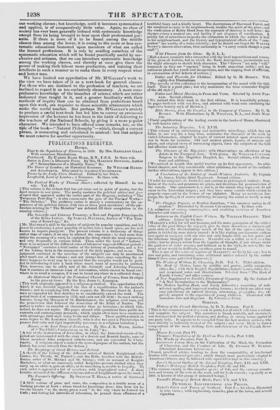IM‘GAVLEY'S LECTURES ON NATURAL P/IILOSOPTIY.
"Tian great inconvenience," says the author in his preface, " ex- perienced by the teachers of the National Schools from the want of a treatise on Natural Philo osohy suited to their circumstances, first induced me to turn my attentien to the arrangement for publica- tion of the course of lectures 1 have been in the habit of delivering to than : I subsequently ventured to hope that such a work mmight be made more generally useffil." ')'his, We take it, means that the book is published with a view to its serving as at text-book in "Na- tiotlal &hoots, and similar ethleatiottal institutions.
Viewed in this light, it is well executed, and likely to be useful. It consists of an outline system of mathematics, pure and applied, and of a similar outline of experimental science. Under the first bead, we find the author tenting of arithmetic, algebra, geometry, and their application to res,nings on mechanics, hydrostatics, pneumatics, and optics. Under the second, we find him discus, sing first these universal ageuts, (or phasnomena of one universal agent,) electricity, galvanism, magnetism, and heat, (under which last he introduces the subject of the steam-engim) ; and lastly, of chemistry, erganie and inorganie. Enough of information is given resiwcting all the topics we have enumerated, to enable the pupil to see clearly the object anal nature of the in- quiries, ze:d their bearing upon the us: MI arts. The scholar who has been carried through this colli=e will have a tolerably accurate notion of the method of mathematical reasoning, and of the ad- vantage derived from the apalication of that method to the solution of mechanical problems. Ile will also be sufficiently initiated into experimental analysis to be taught the important information which may by that process be obtained for the use of the arts. The course of instruction of which time work before us may be mad; the basis, will give the student a bird's-eye view of the field of investigation in material science, initiate hint into the only methods of prosecuting investigation in a manner that can lead. to practically useful conclusions, and exercise him in the practice of these methods. This is all that a teacher can do for any one—show hint what he has to do, put hint in the right way of doing it, watch over his first efforts and point out his blunders and the way to rectify and avoid them in future. We fear the day is still distant when all our skilled artisans shall enjoy the benefits of such a course of tuition ; but when it comes it will bring v ith it not only improvement in our national arts and manufactures, but the raising of a whole class in the scale of huma- nity. There is much fragmentary knowledge floating about among our working classes ; but knowledge, until it becomes systematized and applied, is of comparatively little value. Again, no class of society has ever been generally imbued with systematic knowledge except from its being brought to bear upon their professional pur- suits. If there is more of it to be found among the middle classes than among the lower, it is owing to the more or less sys- tematic educations bestowed upon members of what are called the learned professions. It is only by availing ourselves of the systematic education which will be found practically useful by me- chanics and artisans, that we can introduce systematic knowledge among the working classes, and thereby at once give them the power of making their labour more productive, and training their intellects in such a manner as to make them in every respect wiser and better men.
We have limited our approbation of Mr. APGAGLEY'S work to the view we have taken of it as a text-book for general classes. For those who are destined to the profession of teachers, we are inclined to regard it as too exclusively elementary. A more com- prehensive knowledge of the branches of science which are rather indicated than taught in it, and a greater familiarity with their methods of inquiry than can be obtained from prelections based upon this work, are requisite to those scientific attainments which make the useful teacher. But perhaps Mr. M‘GAILLEY's anxiety to produce a useful text-book has led him to convey an erroneous impression of the lectures he has been in the habit of delivering to 'the teachers of the National Schools, by giving it a more popular character. We intended to have offered some remarks, too, on the title of the book—" Natural Philosophy"—which, though a current phrase, is unmeaning and calculated to mislead : but that subject we must reserve for another opportunity.























 Previous page
Previous page